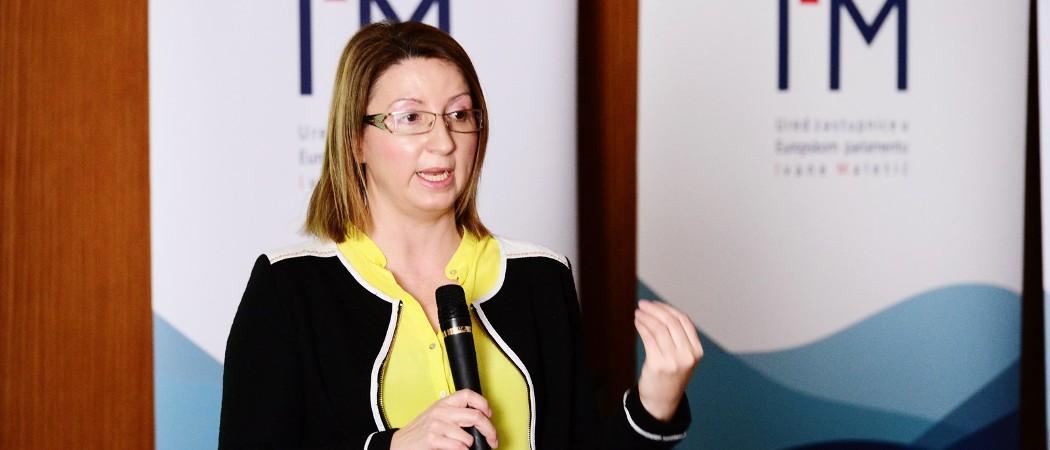Synergies between the EU’s research programmes and money for research channelled through regional funds should be helping bridge the east-west divide in R&I, but gaps in regulation and lack of know-how on the ground are hindering progress

Ivana Maletić, a member of the European Court of Auditors, wants to see more coordination between the EU's major framework research programmes and funding schemes to address the east-west innovation gap
The EU could be doing a better job of exploiting synergies between its big framework research programmes and funding dedicated to research and innovation in the regional funds, according to auditors.
Looking at the previous seven-year EU budget that ran from 2014 - 2020, the auditors concluded the European Commission and national authorities do not cooperate to use the funds in a complementary way, to amplify their impact. Differences in the rules governing the funds also posed barriers, although the Commission is said to have resolved these since.
Poor exploitation of potential synergies hinders the EU’s attempts to tackle the research and innovation divide. The regions that get the most regional funding tend to be the ones that lag behind and extra EU money for research is meant to help them catch up and to exploit research results. But without links to the overarching Horizon 2020 research programme, one-off projects did little to bring left-behind regions closer to Europe’s mainstream.
A similar report in May ruled that the EU’s Widening programme, which also aims to help less innovative countries catch up and boost their participation in EU research, is not ‘a miracle pill’. The auditors say some of the same factors are impeding the progress on both programmes aimed at bridging divides.
In the current seven-year EU budget, there’s even more money for research. In addition to €95.5 billion in Horizon Europe, there is an estimated €56 billion for research and innovation in regional funds and €44.4 billion thus far approved in the pandemic recovery fund. The stakes are higher, and the auditors hope the Commission and member states will take their advice.
“What we are suggesting and recommending to the Commission is that different authorities working on different programmes must cooperate,” said Ivana Maletić, member of the European Court of Auditors (ECA).
Maletić urges member states to use every opportunity they have to exploit research results locally, and the extra funding from the recovery fund gives all the more reason to do so. “We have great research results, but then we stop creating value added for the citizens,” she said. “Now, the [recovery fund] and the [regional development fund] can add additional funding for these types of projects.”
The auditors have higher hopes for the 2021 – 2027 EU budget, but say the Commission and member states must put the work in. “The new period offers new opportunities, but this compartmentalised approach has to be broken,” one senior auditor said.
Amplifying impact
EU spending on research between 2014 – 2020 amounted to a total of 12% of the budget, with €76.4 billion in the Horizon 2020 research programme, and almost €41 billion dedicated to research and innovation in the EU’s regional funds.
The goal of the policy was for the Commission and member states to create synergies between the two big streams of funding for research to amplify the impact.
The auditors looked at four types of synergies: using regional funding to invest in projects that help build up expertise in order to be able to take part in the Horizon research programme; building on projects funded by Horizon; the Seal of Excellence scheme which awards a quality seal to excellent projects that didn’t make the cut in highly competitive EU research calls; and combining resources from both funds to finance projects.
The auditors found there was a lack of vision and focus in the strategic planning. This in particular resulted in poor exploitation of Horizon 2020 results in regional policy, and a failure to properly take up the Seal of Excellence scheme by financing research grants from regional funds.
This was due to the misalignment in the rules for Horizon 2020 and regional funds, poor cooperation between the Commission and member states and between member states, and a lack of expertise and managerial capacities on the ground.
The Commission has taken steps to improve the rules for managing the two funds, but there’s been little progress on boosting cooperation and expertise.
Now, the goal is to take full advantage of the existing framework. “There is no need for more people working in this field in the Commission and member states, but they need more training, more exchange of good practice, more conferences, and ways to see what more can be done,” said Maletić.
The Commission says it’s ready to implement the recommendations. “As noted in the report it is essential to strengthen the coordination of research and innovation and regional policy objectives and communities, as well as to improve the information and monitoring systems of synergies between the two funding programmes,” a spokesman said in response to the report.





 A unique international forum for public research organisations and companies to connect their external engagement with strategic interests around their R&D system.
A unique international forum for public research organisations and companies to connect their external engagement with strategic interests around their R&D system.